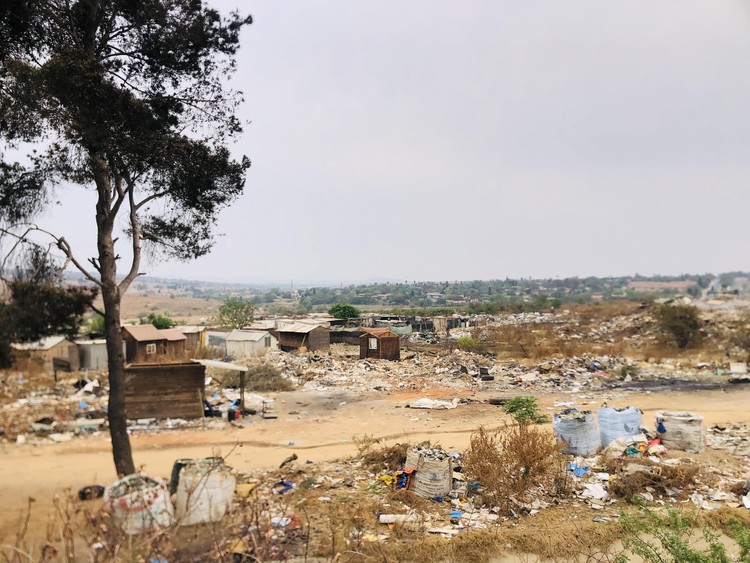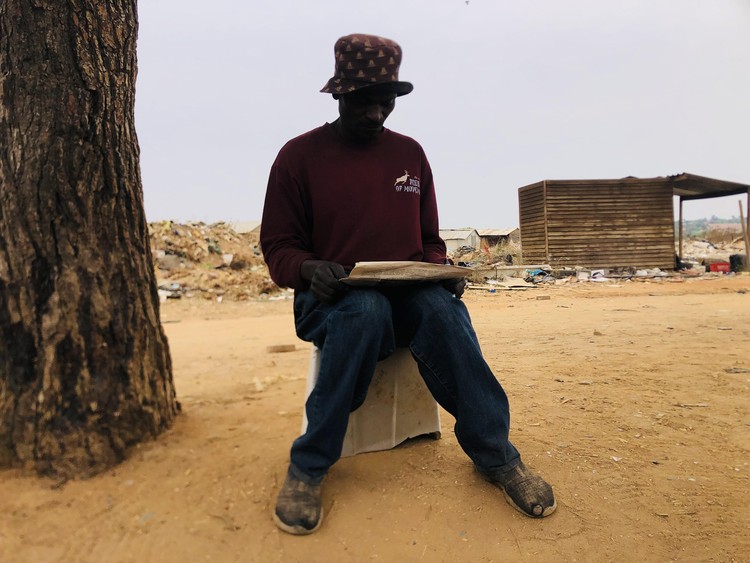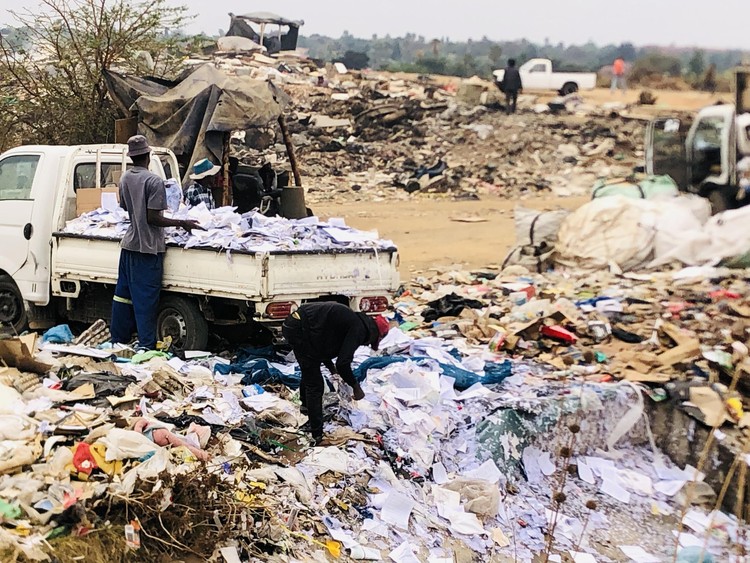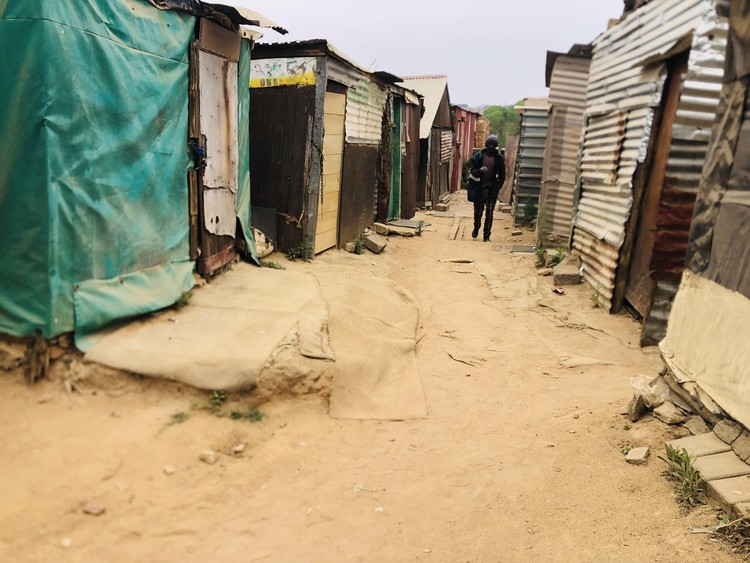Eviction looms for 3,000 shackdwellers in Tshwane
Residents of Mahlangu informal settlement face an uncertain future
Residents of Mahlangu informal settlement in Olievenhoutbosch, Tshwane, have been warned to leave the land by the owners. Photos: Silver Sibiya
- 3,000 people in Mahlangu informal settlement in Tshwane face eviction from privately-owned land.
- Some have lived there for 40 years.
- The City of Tshwane says it is trying to eradicate 500 informal settlements across the metropole through upgrades and formalisation, but Mahlangu is not on State land.
Families have returned to rebuild their shacks in Mahlangu informal settlement in Olievenhoutbosch, Tshwane, after a devastating fire destroyed more than 200 homes. But they face another threat: eviction from the land.
Approximately 3,000 people live in the informal settlement, according to the City of Tshwane Emergency Services Department.
The department said 230 people affected by the fire were temporarily housed in two church shelters, but these were closed on 13 September.
Some of those affected by the fire have rented places elsewhere in the township. Others, like Lesotho national Thabang Motshekga have returned to Mahlangu and rebuilt their shacks.
Motshekga, who has been living in the area since 2014, said he and his girlfriend had nearly died in the fire.
“When I woke up it was smoke and fire all over my shack,” he said. “We couldn’t save any of our belongings. I’m happy to be alive but I’m still heartbroken.”
“I had to rebuild, it’s the only option I have,” he said.
The settlement has no electricity or running water. People rely on two water tanks which are filled by trucks, and some use water from a well dug at a water source on one side of the settlement to wash clothes and blankets. There are eight communal chemical toilets.
Those who can afford to, use small batteries to listen to the radio.
In April, lawyers for Crecora Investments, which owns the land, served residents with a letter of demand, giving them 30 days to leave the land, after which the owners would proceed with a court application for eviction.
The letter, from Patel Incorporated Attorneys, said the land had “considerable dolomite deposits”. “This is a considerable hazard and not suitable for settlement as it could and can result in sinkholes which can cause fatal injuries and loss of life”.
Asked by GroundUp whether the owners had gone to court, attorney Ziyaad Patel declined to answer. GroundUp has not been able to reach Crecora Investments directly.
Philip Mampana has lived in Mahlangu informal settlement for 40 years.
Philip Mampana says he came from KwaNdebele in Mpumalanga and settled in the area in 1982. He said recycling from nearby dumps was the main source of income for most residents.
He also does a little gardening.
Mampana said most of the residents arrived between 2005 and 2010 and were from Lesotho. “We also have people from Zimbabwe, Mozambique, and other locals.”
Sitting with Mampana, listening to old disco music when GroundUp visited, was Paulos Matheswa from Mozambique.
He arrived two years ago and was present when the sheriff brought the eviction letter.
“We were asked to give it to the committee. But after months passed, we didn’t expect it to be enforced.”
“When they remove us from here they must tell us where they will place us,” he said.
Mampana said the settlement had been named after a football player called Vuilduis Mahlangu, who was one of the first residents. “He was a very prominent football player; everyone knew him here. Even during his old age he would do moves that would get the crowd roaring.” Mahlangu has since returned to his home province of Mpumalanga, said Mampana.
Mohlokwane Mohlokwane from Lesotho has been living in Mahlangu for nine years and makes a living selling traditional medicine. “I sell moriana to everyone; they all know me. Even police come here to buy it,” he said.
He said one side of his shack had been burned in the fire. He said the well was too far for him to get water. “I put the fire out with my hands literally.”
Many residents survive by waste picking on dumpsites.
Recently appointed mayco member for human settlements Ofentse Madzebatela said the City was looking into eradicating informal settlements across the metropole.
“We are working very hard to eradicate areas such as this. Our plan is that every financial year there are at least 20 areas such as this that we can upgrade. Part of that is to ‘re-block’, so that when one shack catches fire it does not affect other shacks.”
He said it would take time to formalise informal settlements because there were more than 500 in the City of Tshwane.
“We encourage people not to invade land because when we continue to invade land we slow down the process of ensuring there is housing for all.”
His spokesperson Mfundo Mazwi said that 13 settlements had been upgraded last year, and 27 would be upgraded this financial year. This involved better provision of water, sanitation, electricity and access roads and pathways. But because the land in Mahlangu was privately owned, the municipality could not offer services.
He said up to 95% of people in Mahlangu were undocumented immigrants.
Three thousand people live in Mahlangu informal settlement, according to the City of Tshwane.
Support independent journalism
Donate using Payfast

Don't miss out on the latest news
We respect your privacy, and promise we won't spam you.
Letters
Dear Editor
The problem is they are illegally living on private property. No sanitation, no water, no electricity. They should have moved long ago. It costs the owners millions to evict and by the time they get the eviction there are 10 times more. It has happened on the ground next to me.
Eight years ago one local guy decided to start selling someone else's property, and now there are more than 400 houses. They have illegal electricity, illegal water, no sewerage, no refuse removal... It looks terrible in the middle of our properties. Our properties are now worth nothing. We don't sleep because of noise. We are afraid. But municipality does nothing about it and it is in our bylaws. It's not our ground. The owners' are in Pretoria, so we cannot do anything and the owners don't see it.
© 2024 GroundUp. This article is licensed under a Creative Commons Attribution-NoDerivatives 4.0 International License.
You may republish this article, so long as you credit the authors and GroundUp, and do not change the text. Please include a link back to the original article.
We put an invisible pixel in the article so that we can count traffic to republishers. All analytics tools are solely on our servers. We do not give our logs to any third party. Logs are deleted after two weeks. We do not use any IP address identifying information except to count regional traffic. We are solely interested in counting hits, not tracking users. If you republish, please do not delete the invisible pixel.




